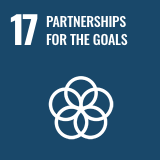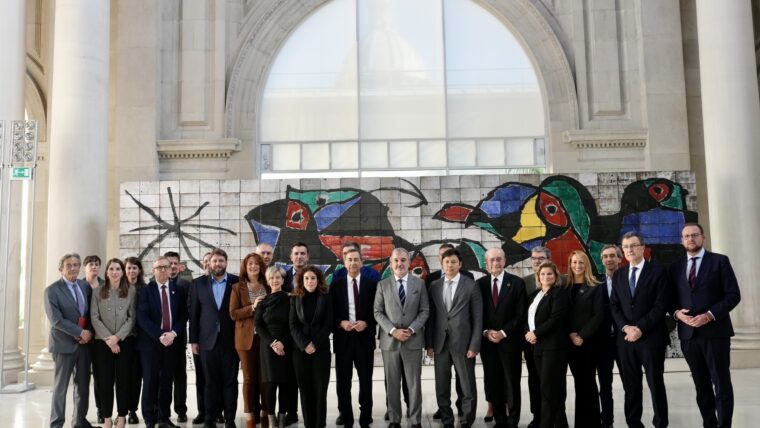Goal 17:
Partnerships for the goals
Revitalize the global partnership for sustainable development

SDG 17 is dedicated to the means necessary to achieve all the other goals. One of these is international cooperation, since the principal of ‘no one left behind’ also applies to countries.
Thus, in almost all of the social, economic and environmental action areas, the more advanced countries are called upon to give support to those that are less advanced. Donating 0.7% of their own revenue is recommended as a guideline. Often, however, the most useful way to support them can be by transferring technology. Regional and international North-South, South-South and triangular cooperation in science and innovation is fundamental.
Internally, for each country, region or city, the most important thing is to formalise a plausible commitment to the 2030 Agenda, which they should then sustain via effective alliances with public actors, the private business sector and organised society. Their credibility is put to the test with the coherence of the policies they adopt and the establishment of a system to measure the advances or setbacks experienced on the road towards achieving the SDGs.
17.1 Strengthen domestic resource mobilisation, including through international support to developing countries, to improve domestic capacity for tax and other revenue collection
17.2 Ensure developed countries fully implement their official development assistance commitments, including the commitment by many developed countries to achieve the target of 0.7% of gross national income for official development assistance (ODA/GNI) to developing countries and 0.15% to 0.20% of ODA/GNI to least developed countries; ODA providers are encouraged to consider setting a target to provide at least 0.20% of ODA/GNI to least developed countries
17.3 Mobilize additional financial resources for developing countries from multiple sources
17.4 Assist developing countries in attaining long-term debt sustainability through coordinate policies aimed at fostering debt financing, debt relief and debt restructuring, as appropriate, and address the external debt of highly indebted poor countries to reduce debt distress
17.5 Adopt and implement investment promotion systems for least developed countries
17.6 Enhance North-South, South and triangular regional and international cooperation on and access to science, technology and innovation and enhance knowledge sharing on mutually agreed terms, including through better coordination between existing mechanisms, in particular at the United Nations level, and through a global technology facilitation mechanism
17.7 Promote the development, transfer, dissemination and diffusion of environmentally sound technologies on favourable terms, including on concessional and preferential terms as mutually agreed
17.8 Fully operationalise the technology bank and science, technology and innovation capacity-building mechanism for least developed countries by 2017 and enhance the use of enabling technology, in particular information and communication technology
17.9 Increase international support for implementing effective targeted capacity-building in developing countries to support national plans for implementing all the Sustainable Development Goals, including through North-South, South-South and triangular cooperation
17.10 Promote a universal, rules-based, open, non-discriminatory and equitable multilateral trading system under the World Trade Organisation, including though the conclusion of negotiations under its Doha Development Agenda
17.11 Significantly increase the exports of developing countries, in particular with a view to doubling the least developed countries’ share of global exports by 2020
17.12 Achieve timely implementation of duty-free and quota-free access on a lasting basis for all least developed countries, in accordance with World Trade Organisation, including by ensuring that preferential rules of origin applicable to imports from least developed countries are transparent and simple, and contribute to facilitating market access
17.13 Enhance global macroeconomic stability, including through policy coordination and policy coherence
17.14 Enhance policy coherence for sustainable development
17.15 Respect each country’s policy space and leadership to establish and implement policies for poverty eradication and sustainable development
17.16 Enhance the Global Partnership for Sustainable Development, complemented by multi-stakeholder partnerships that mobilise and share knowledge, specialisation, technology and financial resources, to support the achievement of the Sustainable Development Goals in all countries, in particular developing countries
17.17 Encourage and promote effective public, public-private and civil-society partnerships, building on the experience and resourcing strategies of partnerships
17.18 By 2020, enhance capacity-building support to developing countries, including least developed countries and small island developing States, to significantly increase the availability of high-quality, timely and reliable data disaggregated by income, gender, age, race, ethnic origin, migratory status, disability, geographic location and other characteristics relevant in national contexts
17.19 By 2030, build on existing initiatives to develop measurements of progress on sustainable development that complement gross domestic product, and support statistical capacity-building in developing countries






